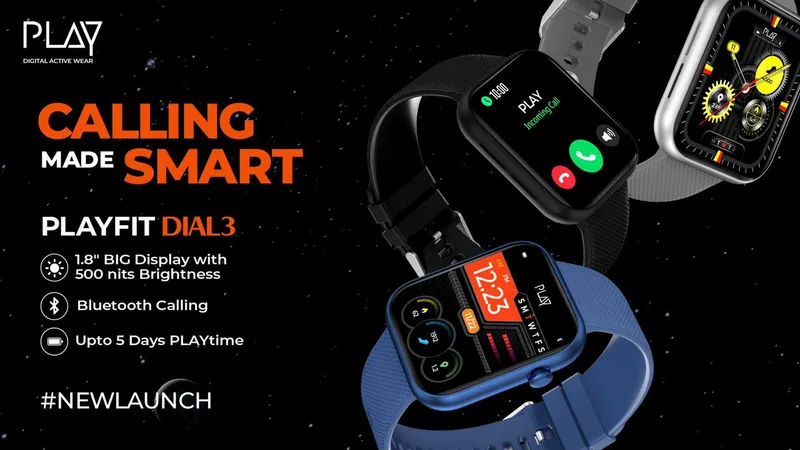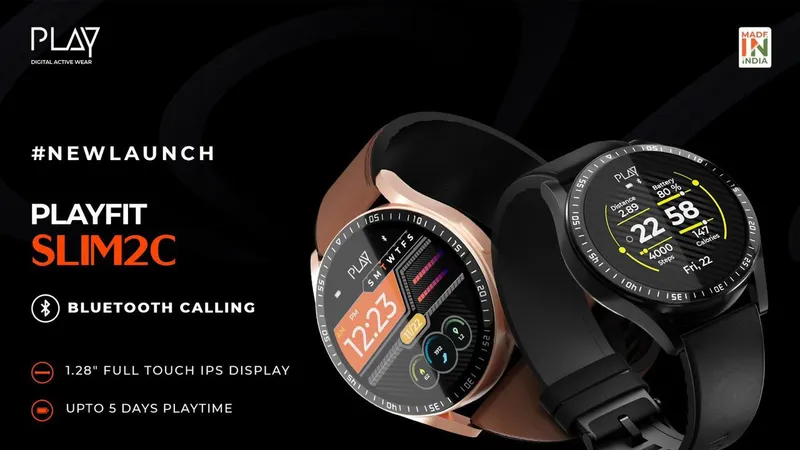Retailing in 45,000 stores, this homegrown wearables brand is taking on Noise, boAt
World of Play was founded in 2019 to produce wearables tailored to the needs of Indian consumers. It clocked in a revenue of around Rs 100 crore in FY23.
Key Takeaways
- Play started in 2019 to tailor wearables as per the needs of Indian consumers.
- The Gurugram-based brand offers 30 products in the categories of wearable devices and TWS.
- The company sells products in 45,000 retail outlets in India and aims to double its footprint in FY24.
Smartwatches have come a long way. From the 1980s when Seiko TV Watch hit the market with its LCD television screen to Apple Watch bringing wristwatches back into vogue, the industry has evolved by leaps and bounds.
“For a consumer, it is not about whether you bring in 4G or 5G, but about the incremental experience that they can enjoy with the new technology,” Vikas Jain, Co-founder of consumer wearables brand World of Play, tells SMBStory.
The co-founder of consumer electronics company Micromax started in 2019—this time, to bring another tech intervention to consumer wearables in India.
The Gurugram-based brand offers 30 products in the categories of wearable devices and TWS (true wireless stereo).
Its Playfit series consists of smartwatches and fitness bands, whereas the Playgo range covers audio equipment like wireless neckbands, earbuds, and wireless speakers. The company is focused on internet-of-things (IoT) devices and over 50% of its revenue comes from smartwatches.
How did it start?
Play Co-founders Jain and Sandeep Banga go back a long way. They were schoolmates and studied engineering together at Gannon University in the US in the late 1990s.
They again met in 2019 to discuss the mobile ecosystem in India and how global brands entering the market were missing the mark.
“Global brands try to bring in a global portfolio which may or may not resonate with the Indian consumers,” Jain adds.
The co-founders wanted to bring differentiation in the market and invested an undisclosed sum from their personal savings to start the company. The idea was to produce wearables tailored to the needs of Indian consumers.

Play Products
With a 50-membered team—10 in design—the company gives a strong emphasis on product design for its audio devices and offers its sound signature called EBEL (Enhanced Bass and Extra Loud), enhancing the bass.
“India is a highly boisterous country. If I’m outdoors trying to listen to music, I may not be able to enjoy it because the ambient sound is so much. Our devices give a certain bass and loudness that makes the audio experience better than other global devices,” he explains.
In the wearable space, Play focuses strongly on data privacy and data protection. “We get to process a lot of data. For us, it's very essential that the data does not leave the Indian shores,” says the co-founder, adding that the data is stored on highly-secure servers in India.
Another feature is enabling Play devices to transfer historical data from one device to another within the brand.
“We have also been giving consumers watch faces or mood boards related to what is happening in the country. Like currently, there are many mood boards available around cricket owing to the IPL fever,” he explains.
Reaching out to customers
The brand started by selling in offline stores. Currently, the company makes 98% of its sales from retail stores, with its products sold in over 45,000 outlets across India. It clocked a revenue of around Rs 100 crore in FY23.
It is also present on ecommerce platforms like Amazon and Flipkart, as well as sells through its website.

Play Products
The wearable devices range from Rs 1,800 to Rs 5,000 on its website, while the audio devices start from Rs 1,299.
The company has its own manufacturing unit in Bhiwadi, Rajasthan, and also works with third-party EMS (electronic manufacturing services) companies for production.
However, during the initial lockdown of the pandemic, the team couldn’t use any tools, machines, or other supplies, so focused on processes instead.
“We had to reconsider our understanding of the consumer because there were several inorganic changes in consumer behaviour,” Jain says.
People wanted to spend more time on their fitness and they became more digitally aware during the lockdown, which boosted the company’s growth. "That was a good opportunity,” the co-founder adds.
“We've been very clear on communicating to the consumer that what we've been providing is pure fitness monitoring,” Jain explains.
Post the pandemic, there was an upsurge in demand for both audio devices and wearables, resulting in increased sales.
The market and looking ahead
The Indian wearable market saw a strong 46.9% year-on-year growth in 2022 as shipments reached 100 million units, according to a report by International Data Corporation.
The brands leading the category are Indian brands Noise, boAt, and Fire-Boltt, followed by the Chinese brands OnePlus and Realme.
World of Play is now integrating third-party APIs (application programming interfaces) for developing new features for its products, and ensure older devices are also compatible. The new features will include updates on various topics such as cricket, stock market, based on data or feedback from users about their interests.
It is also working to create clinical-grade sensors rather than just relying on AI-generated metrics for producing health-related data such as several metrics related to physical health and cardiovascular function, through third-party developers. It plans to foray into newer categories like personal security monitoring and home entertainment.
“Our channel development team is focusing on newer states. Newer geographies are being opened,” says Jain.
Play plans to double its retail footprint by the end of FY24 and it also aims to double its revenue on the back of growing demand for wearables in India.
Edited by Kanishk Singh







